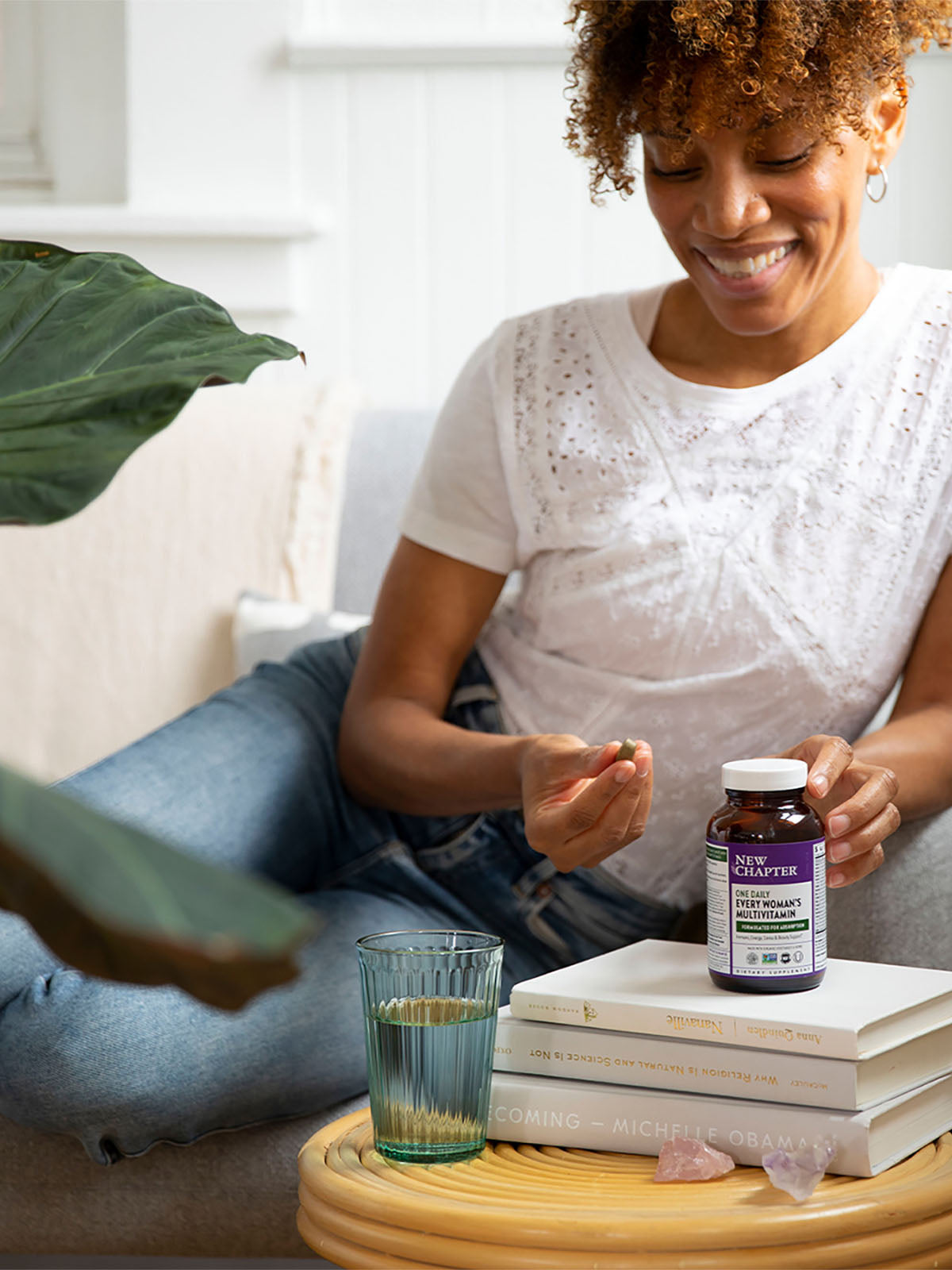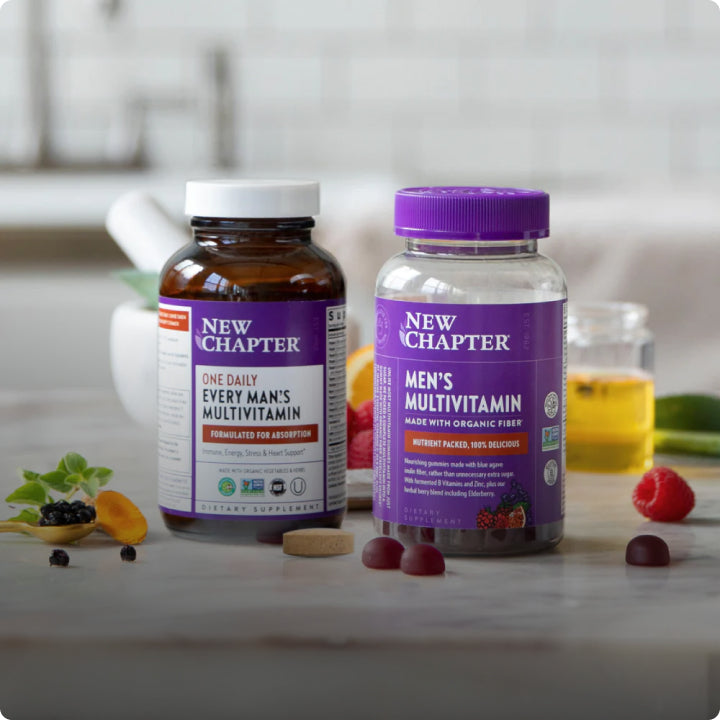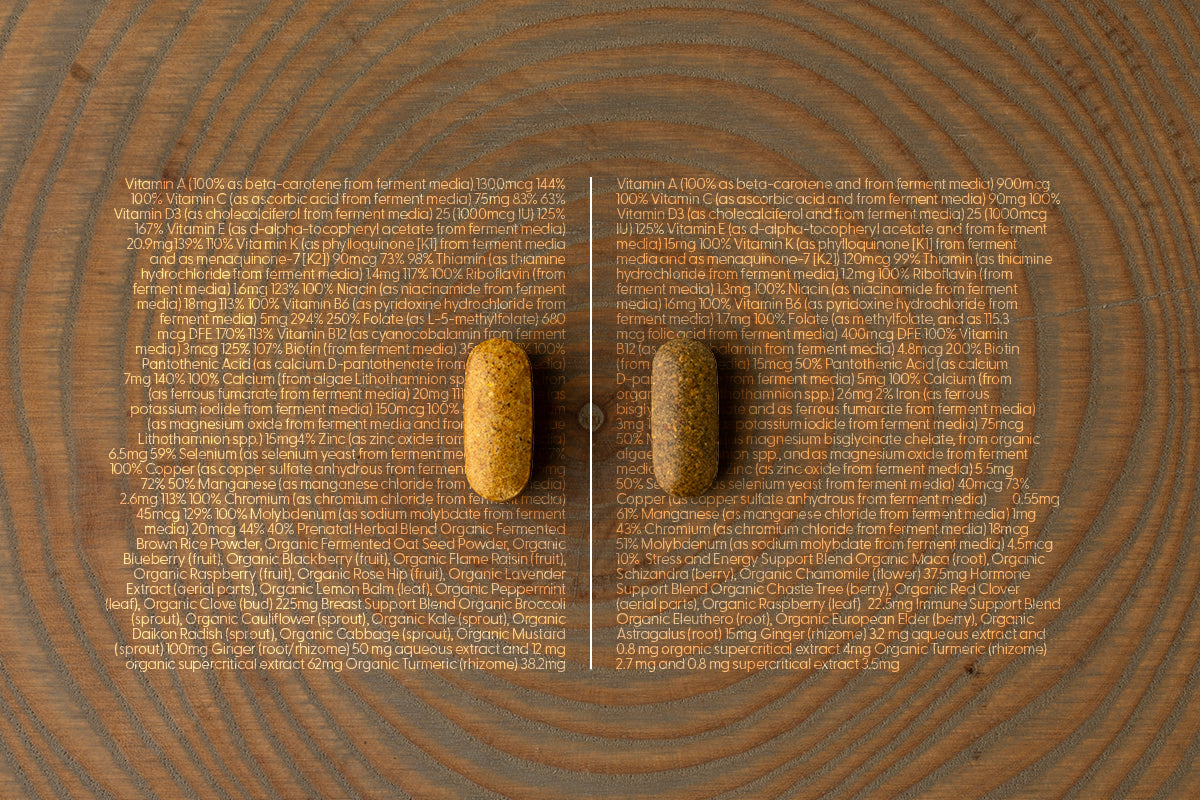The word “bacteria” may not immediately bring up images of a happy, healthy you. But when it comes to how the body works and stays well, bacteria are vital for human life! The truth is, your overall health is powerfully linked to the activity of good bacteria and other microorganisms that live in your digestive tract. The good bacteria and yeasts that populate your gut (your “gut flora”) help you digest food, produce vitamins, eliminate toxins, and more. Together, these trillions of tiny denizens make up your microbiome.
What Are Probiotics?
First, what does “probiotic” mean? “Pro-biotic” has its roots in Greek and means “for life.” Probiotics are the good bacteria and yeasts that can be consumed as dietary supplements and in fermented foods. While not always identical to all the microorganisms found naturally in your body, probiotics from supplements and foods are similar and can help support the health and activity of your natural flora. The benefits of taking probiotics include helping to balance or restore gut health. Studies have shown that the health of your microbiome is influenced by your diet. If you feel you need some extra help and balance, digestive health supplements containing probiotics might be an option.
Prebiotics, Probiotics & Postbiotics: What’s the Difference?
So what are all these “biotics” you may be seeing in supplements? Let’s break it down:
- Probiotics are living, beneficial microorganisms that help support optimal gut health. There are many types of probiotic supplements available. Some are formulated with targeted, science-backed strains—this is the approach that New Chapter takes. Foods that can act as sources of probiotics include yogurt, sourdough, kombucha, tempeh, sauerkraut, and a variety of other fermented items.
- Prebiotics are included in some probiotic supplements. Adding prebiotics, usually in the form of fiber, acts as fuel or nutrition for the good bacteria in the microbiome. For example, the prebiotic inulin fiber from chicory root in our delicious Probiotic + Prebiotic Gummies is there to nourish your natural gut bacteria.* (It also replaces unnecessary extra sugar in our gummies!) You can also get prebiotics from foods such as steel-cut oats, asparagus, bananas, and other foods high in fiber.
- Postbiotics are beneficial compounds or metabolites created by the probiotics themselves and can be considered the “jewels of fermentation.” Postbiotics are included to help round out gut-healthy benefits of some supplement formulations.
What Are Colony Forming Units?
Probiotics in supplements are measured in colony forming units, or CFUs. This measurement indicates the number of viable cells, and can range from billions to megabillions! However, it’s important to know that more is not necessarily better when it comes to CFUs. If you’re comparing probiotic supplements, be sure to check that CFU levels are clearly connected to a potent, excellent quality, tested probiotic strain. Just putting in a laundry list of bacteria in huge amounts doesn’t necessarily mean they’ll do what you expect. Studies show that key probiotic strains like Lactobacillus can be effective in amounts of 5 or 10 billion, for example. If the probiotic strain is ultra-concentrated and very high-quality, 1 billion CFU can be the perfect amount for daily wellness benefits. These potent probiotics pack a punch!
What Is Gut Flora?
When you dive into the world of probiotics, you’ll often come across the term “gut flora.” This is simply another name for the collection of bacteria, yeasts, and other microorganisms that live in your digestive tract, mainly the upper and lower intestines. Your gut flora perform vital tasks for your overall wellness, including the production of vitamins such as biotin and vitamin K. Those interested in learning how to restore a healthy gut flora may want to look into overall microbiome balance with probiotic foods or supplements.
What Types of Probiotics Should I Look For?
You may be tempted to search for a supplement that includes as many types of bacteria as possible. But megadoses of multiple mixed strains won’t necessarily produce results. Instead you may want to focus on formulations that deliver the right strains in amounts known to work.
Bacillus coagulans
This strain of beneficial bacteria has been studied for its ability to support GI health and promote quality of life as it relates to digestive health. Notably, 2 billion CFU of Bacillus coagulans was found to be an effective dose—no megabillions needed.
Bifidobacterium B420
This bacteria strain (also known as Bifidobacterium animalis ssp. Lactis) has been shown to help add healthy gut bacteria to the microbiome and support the digestive system.*
Bifidobacterium BR03
Bifidobacterium breve is found in the large intestine where it helps break down carbohydrates from plant-based foods. The BR03 strain can work together with LP01 to support both the body’s immune response and promote digestive health.
Lactobacillus HN001
This beneficial bacteria (also known as Lactobacillus rhamnosus) also supports vaginal health. Both this strain and La-14 adhere to cells in the delicate vaginal lining to help actively defend against challenges.
Lactobacillus La-14
Lactobacillus acidophilus La-14 has been clinically studied for its ability to promote healthy vaginal flora. Like the gut, the vagina has a natural population of good bacteria that keep it healthy. When vaginal Lactobacilli are in healthy balance, it supports an ideal, slightly acidic environment (low pH).
Lactobacillus LP01
Lactobacillus plantarum lives naturally in the small intestine and can be found in fermented foods such as sauerkraut and yogurt. It can produce hydrogen peroxide to help ward off outside microorganisms. LP01 has been studied for digestive support, particularly for helping with bowel regularity.
Saccharomyces boulardii
This probiotic yeast has holistic benefits. It can establish itself in your gut and help good bacteria flourish throughout your microbiome.
Saccharomyces cerevisiae var. boulardii CNCM-I1079
This probiotic strain variant survives antiobiotic use†! It is naturally strong and robust so is able to help maintain digestive balance and support your microbiome—and even helps reduce occasional diarrhea.*
From this list you can see how important it is to get exactly the right strain—the one that was researched for the benefits you want. New Chapter® probiotics are formulated with strains in the perfect amounts so you can be sure you are getting the wellness benefits you deserve.
Some of our formulas are also rounded out with complementary herbs. Our probiotic-prebiotic digestive wellness supplement features extracts of organic hibiscus and organic green coffee bean, which have known antioxidant benefits. Our women’s probiotic formula delivers chaste tree berry extract to promote hormonal balance in addition to vaginal health benefits.*
Benefits of Taking Probiotics
As mentioned earlier, probiotics are very similar to the beneficial microorganisms already found in the body. Taking them in dietary supplement or food form is believed to help balance, bolster, or restore your internal microbiome. While your gut is a major home to these microbes, they’re also found in the mouth, vagina, urinary tract, lungs, and skin. Probiotics can have a more holistic impact than one may have thought!
For gut health, All-Flora™ Probiotic is masterfully crafted for advanced digestion, microbiome & GI support.* It’s a clinical-strength triple probiotic blend that’s perfect for those seeking a healthy, happy gut and GI tract.*
For women’s health, Women’s Daily Probiotic is designed to support vaginal health and hormone balance.* This formula includes 10 Billion CFU Lactobacilli probiotics plus chaste tree extract.
For holistic microbiome support, our Daily Dual Biotic formula delivers both prebiotics and probiotics plus whole-food herbs including green coffee bean. This blend is perfect for healthy gut flora and overall digestive support.*
For 100% delicious dual-action digestive support, All-Flora Probiotic + Prebiotic Gummies support a healthy digestive system, with 3 g prebiotic fiber‡ from chicory toot to fuel your natural good bacteria.*
Perfect to take at mealtimes, All-Flora Probiotic Enzyme Complex is designed with probiotics that help relieve gas, bloating, and GI distress, plus clinical-strength digestive enzymes for better digestion over time and vitamin B12 for that supports better metabolism of fats and proteins.*
For a probiotic formula that survives antibiotic use†, All-Flora Probiotic Flora Fortify is crafted with naturally strong, ultra-concentrated probiotics plus nature's essential electrolytes magnesium & chloride.* Helps fortify a healthy digestive system.*
For support from peri- to post-menopause, All-Flora Probiotic Menopause Balance pairs clinical-strength probiotics for vaginal microbiome support with the traditional herb black cohosh to tackle hot flashes and night sweats.*
Digestive Support
Probiotic supplements can support your gut’s good bacteria in doing their job, which is to break down food you’ve ingested. This includes complex carbohydrates and high-fiber foods that might otherwise be tough for your intestinal tract to handle. There’s data to suggest that certain probiotic strains can help your body to better absorb protein and other nutrients, as well.
Reduce Gastrointestinal Discomfort
Probiotics have shown a lot of promise when it comes to addressing several types of diarrhea (including that caused by antibiotics). They also help to support bowel regularity and relieve constipation, and help reduce occasional gas, bloating, and GI distress. They can be a great travel companion for these reasons. If you’re curious about how probiotics might help with other types of GI distress such as Inflammatory Bowel Disease (which includes ulcerative colitis and Crohn’s disease), check in with your healthcare professional for information.
Vaginal Health
Like the healthy gut, the healthy vagina is a well-balanced ecosystem of microorganisms. That ecosystem can sometimes be thrown off by antibiotics, spermicides, or birth control pills. Probiotics may be helpful in restoring balance and helping prevent common issues. Check in with your healthcare professional about what’s right for you.
How Long Do Probiotics Take to Work?
It may take some trial and error to find the right probiotic for your needs. Keep in mind that every person is different, and every microbiome is unique. Some people often see initial improvements in health and digestion around 1–2 weeks after starting a probiotics regimen. You might notice some bloating and gas or changes in your stool, but these are all indications that the probiotic is working vs. signs of an unhealthy gut. For more specific information, consult the Suggested Use information on the supplement you are taking, or talk with your healthcare professional.
Types of Probiotic Supplements
Next time you visit your favorite natural health retailer, you may find a LOT of options for probiotic supplements. Some are even in powder form that can be spooned into smoothies or yogurt. In general, though, there are two main forms for supplementary probiotics: capsules and gummies.
Capsules
Probiotic capsules are often a two-piece type that fits together and holds the formula inside. Some probiotic supplements are in softgels, which is another common pill form. (Note that softgels are sometimes made from animal gelatin. Two-piece capsules are typically plant-based.)
Gummies
Gummy supplements can be an excellent way to support your healthy lifestyle without needing to swallow pills. New Chapter probiotic gummies are made with fiber† instead of unnecessary extra sugar, so you can be sure that every daily dose is packed with good stuff.
Tips for Taking Probiotics
Consult your doctor before adding any supplements (probiotic or otherwise) to your daily routine. They can recommend the best strains of good bacteria for your concerns.
When to Take Probiotics? Should Probiotics Be Taken With Food?
In general, probiotics can be taken whenever is best for you, whether with or without a meal. This may mean that first thing in the morning, with breakfast, is a good option, or perhaps before bed, when you’re done eating for the day. Once you’ve found a time that works well with your schedule, try to stick to it—consistency is key.
Who Should & Should Not Take Probiotics?
For those who are seeking to maintain overall health and wellness, probiotics can be a nice addition to one’s daily regimen. However if you have a weakened immune system, have been ill, or are recovering from recent surgery, please check in with your healthcare professional about any supplements you take. Moms-to-be can also check in with their prenatal care provider about probiotics or any other supplements (they are considered “probably safe” by the American Pregnancy Association).
If you are wondering when to take probiotics with antibiotics, check with your doctor for the best recommendation. Since antibiotics are used to kill bacteria— all bacteria—logic suggests that the two shouldn’t be taken at the exact same time if you want to reap any benefits from the probiotic. Even just a few hours apart might help.
How Should Probiotic Supplements Be Stored?
New Chapter Probiotic supplements can be refrigerated but are also shelf stable (can be kept outside of fridge if desired). If shopping at your favorite natural foods store or supermarket, probiotic supplements might be in the refrigerated section for the sake of convenience. Check the directions on your particular product for storage instructions.
The Bottom Line
Humans are natural hosts to trillions of important guests—those tiny microorganisms that live and work throughout our bodies. Friendly bacteria and good yeasts are essential for how we digest food, fight infection, eliminate toxins, and much more. Our busy inner community, the microbiome, is so important it’s also known as the “second brain.” Good news: You can help keep a good balance of these vital microorganisms with a carefully formulated probiotic supplement. Nourish your happy, healthy microbiome by looking for trusted strains delivered in effective amounts, like New Chapter’s family of formulas. We’re here for your probiotic needs!
† Flora Fortify is not intended to treat side effects of antibiotic use.
‡ Not a significant source of dietary fiber







